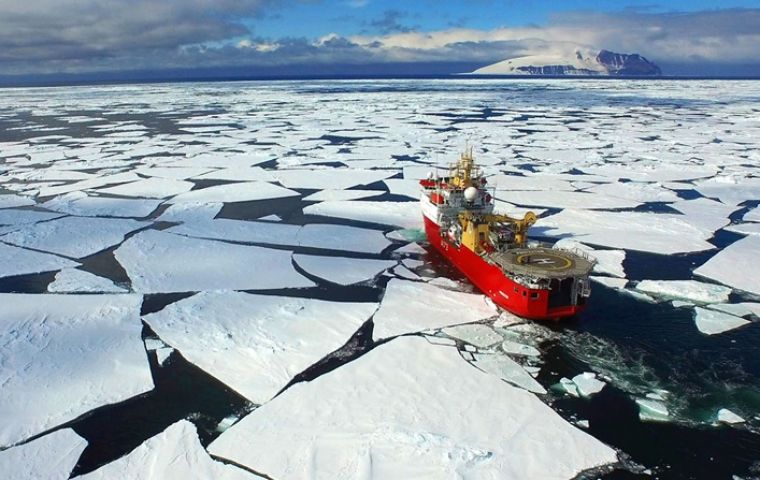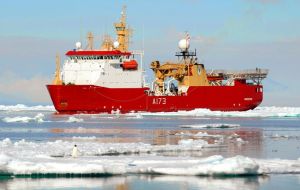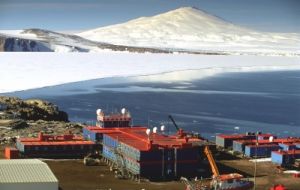MercoPress. South Atlantic News Agency
Ice Patrol HMS Protector concludes historic five week patrol to East Antarctica and Ross Sea
 The Ice Patrol breaking ice while sailing in the Ross Sea, and among other duties conducted CCAMLR inspections
The Ice Patrol breaking ice while sailing in the Ross Sea, and among other duties conducted CCAMLR inspections  HMS Protector is the first Royal Navy or UK Government, vessel to have visited the region in 80 years or to have travelled below 77 degrees latitude.
HMS Protector is the first Royal Navy or UK Government, vessel to have visited the region in 80 years or to have travelled below 77 degrees latitude.  The ship also paid a visit to the Italian Antarctic research station, Mario Zucchelli, an opportunity for some classic pictures of Antarctica including penguins
The ship also paid a visit to the Italian Antarctic research station, Mario Zucchelli, an opportunity for some classic pictures of Antarctica including penguins The Royal Navy’s Ice Patrol ship has just completed a historic five week patrol to the East Antarctic and Ross Sea. HMS Protector is the first Royal Navy, or UK Government, vessel to have visited the region in 80 years or to have travelled so far south having dipped below 77 degrees latitude.
Her mission has been to support the work of the Convention for the Conservation of Antarctic Marine Living Resources (CCAMLR) in protecting the unique Antarctic eco-system through close co-operation with Australia and New Zealand.
During her patrol Protector inspected a number of fishing vessels to ensure they adhere to the strict licensing regulations in the area.
In addition the ship also paid a visit to the Italian Antarctic research station, Mario Zucchelli, while members of the ship’s company paid homage to the legendary British Antarctic explorers: Captain Robert Falcon Scott RN and Sir Ernest Shackleton.
The UK is a founding signatory of the Antarctic Treaty and takes its responsibilities in the region very seriously – determined to uphold the key tenets of the Treaty of protecting the environment and preserving the area for scientific research.
Within 24 hours of arriving in the Ross Sea, the ice patrol ship had carried out the first of several CCAMLR inspections with six embarked Australian and New Zealand specialists to support.
While in the Ross Sea, Protector visited the Antarctic research station, Mario Zucchelli, on the shores of Terra Nova Bay where Italian scientists proudly showed their facility.
During the Austral Summer, the Ross Sea can lose most of its ice and it is possible for ships to push further south than anywhere else on the continent. It was from this region that the great Antarctic explorers mounted their expeditions to reach the South Pole.
The legendary Norwegian explorer, Ronald Amundsen started the journey that led him to being the first person to reach the South Pole from the Ross Ice Shelf.
Similarly, the British explorers, Captain Robert Scott and Sir Ernest Shackleton commenced their epic journeys from the Ross Sea including Scott’s fateful final expedition in 1911/12.
In honour of Scott, Shackleton, and the men they led, many of Protector’s ship’s company visited the huts they used as their base stations. Protector’s ship’s company were granted permission to visit Scott’s hut at Cape Evans by the New Zealand Antarctic Heritage Trust.
The embarked New Zealand Defence Force liaison officer, Lt Cdr Hickey, acted as guide for the visit and the sailors got to witness a scene that had been untouched in years.
Fur boots and skis lay where they had been left, the wooden bunks still have their sleeping bags and clothes were hung over stoves, as if drying in the warmth.
It was there that Protector’s chaplain, Rev Andrew Allcock, held a remembrance service in memory of those who died during their return journey from the Pole.
After the visit to Scott’s hut the ship went on to pay respect to Sir Ernest Shackleton and his team – fifteen miles to the north, another visit facilitated by the New Zealand Antarctic Heritage Trust.
By visiting this region Protector achieved a latitude of 77 Degrees 56 Minutes South – the very edge of the vast Ross Ice Shelf, named for James Clark Ross who led the exploration of the area. No official British ship has been this far south since 1936 and it is believed not since James Clark Ross’s own expedition in 1842.
HMS Protector sailed from Plymouth in early October, travelling the long way East via the Suez Canal, Oman and Western Australia to Hobart so that she conduct CCAMLR inspections in the Ross Sea.
The majority of the Austral Summer period will be spend on the Australasia/Pacific Ocean side of Antarctica, an area of the continent that the UK has not had a maritime presence in for nearly 80 years. She will return to the Antarctic Peninsula and the British Antarctic Territory for her final patrol of the season.
HMS Protector conducts patrols on behalf of the Foreign and Commonwealth Office, surveys for the Hydrographic Office and provides logistic support to the British Antarctic Survey.




Top Comments
Disclaimer & comment rules-

-

Read all commentsRule Brittannia, rule Brittannia, Brittannia rules the waves
Jan 19th, 2016 - 09:35 am 0The Royal Navy are never far away.
Jan 19th, 2016 - 07:37 pm 0Commenting for this story is now closed.
If you have a Facebook account, become a fan and comment on our Facebook Page!